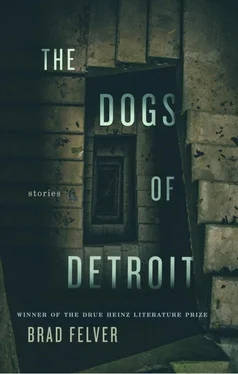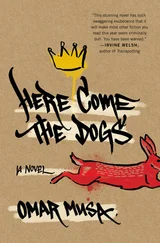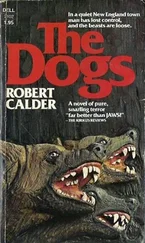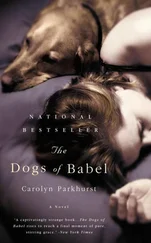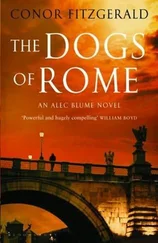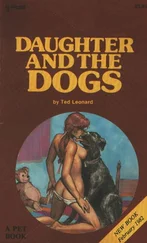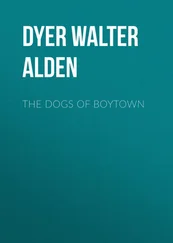One day, Polk comes home to find Mrs. Roudebush sitting at the table with his father. She clutches her purse and smiles at him, her sad smile like an apology. “We’ve missed you,” she says.
Polk looks down, and his eyes land on his hands, his large and awkward hands smeared with paint. He looks back up at Mrs. Roudebush, but before he is forced to speak, she reaches into her purse and pulls out a paper bag. She sets it on the table. “I was doing some cleaning,” she says. She stands up to leave, hangs her purse from her shoulder. “My husband,” she says, “he died three years ago.”
Polk feels himself flinch and stare at her.
“I used to roll over in the middle of the night, and he was in bed with me. Sometimes I even heard him snore. I swear I did. Sometimes I would wake up, and his radio would be going. I told my sister about it, but you could tell she didn’t believe me. That was hard. I couldn’t understand why it had to be like that. I refused to change the sheets because I thought he was in there somehow. I slept on those sheets for a year, every night hoping to feel him or smell him or hear his snores. Sometimes I did, and sometimes I didn’t. It was all I thought about. I moved the microwave and the television into the bedroom. I lived in there. One day, my sister found me like that, and she made me take a shower and wash the sheets. Do you know what we found when we stripped the bed?”
Polk shakes his head, no.
“A small painting, an acrylic on canvas, no stretcher. At first I didn’t recognize it, but then I realized it was a scene I had done, probably thirty years ago, not long after we were married, my husband thin and clean shaven, me thin and with a long pony tail. We were standing in front of our first house, not far from here. I had forgotten about that painting, but there it was under the mattress pad.”
She looks to Polk’s father. “There’s no explaining that.”
“Did he put it there?” Polk asks.
“I don’t know, dear. I really don’t. But I think the dead teach us how to grieve,” she says. “I don’t understand it, either, but that’s what I think. Sometimes people can be gone and not gone at the same time. They know things we don’t know.” She smiles at him. “God doesn’t hate you, Polk.”
That night Polk lies on the floor. The bag of paint sits next to him. He hasn’t yet opened it, but he knows what’s in there. He wants to go outside right then and use them, take a flashlight and find the tracks and paint them. What are you trying to teach me? he wonders. He finds himself packing a bag of supplies: bottles of water, beef jerky, Skittles, dog treats, extra socks, a Maglite, toilet paper. He rolls his set of maps up tightly.
He walks out into the kitchen, where his father is sitting at the table. He turns to look at Polk, and dangling from his lips is a cigarette butt. Remnants of her. It has been stubbed out and twisted, unlit, hanging limply. His father is startled. “Polk,” he says. “Can’t you sleep?”
“She’s out there,” he says. “Every night, right now, she’s out there. Her tracks are freshest in the morning.”
“No,” his father says. He pulls the cigarette from his mouth and delicately places it back in the ashtray as if it is some fragile treasure. “You’re not doing this.”
Polk shrugs. It’s time, he knows this. If he waits much longer, he’ll lose her.
“I’ve let this go on too long.”
“You have to sleep at some point,” Polk says.
“I won’t allow this.”
“I’ll bring her home,” Polk says.
“She’s not out there, Polk. You’re looking for trouble. You want to join her.”
“You’re just glad she’s gone. You don’t have to help her now.”
His father smacks him then, the flat of his palm on Polk’s cheek. This is by no means the first time his father has struck him, but this time is different—this is anger.
Polk pounces on this father. They tumble over the table, spill onto the floor. They struggle. Polk hears himself grunt and snarl. He doesn’t punch and kick so much as he thrashes wildly. Then he catches an elbow to the eye, and the world blurs. He yelps with the pain, grabs at it with both hands. His father stops, bends over Polk to examine it.
“Let me look at it, Polk.”
There is a cut clean through his eyelid, like a half-peeled orange. It won’t close all the way. Even when he tries, light seeps through the crack. Everything is mottled, ill-defined edges, blurred colors. They put ice on it, then a hot rag, then some ointment. “Polk,” his father says. “Jesus, Polk. I didn’t—”
“It’s fine. I’m fine.”
“You need stitches.”
“Stop.” Polk wheezes and coughs. “It felt good, didn’t it?”
His father looks like he is the one who is wounded. “Do you really think that?” His face is drawn, defeated. He bends and picks up the ashtray and butts and sweeps the ashes into a pile. He doesn’t look up. “If you want to go, I can’t stop you.”
The moon glows full, or near-full, throwing an eerie sort of light, like the structures themselves blush. Polk must cock his head to the side or cover his thrashed eye to see more clearly. Soon he is trolling the site, rummaging from building to building, tracing his way methodically, following his maps. Even after months of scouting dogs, tracking his mother, noting everything, he has explored only a fraction of the compound. It is like a series of cave systems that turn out to be linked, spreading out forever in all directions. But he has supplies. He will mimic her movements for as long as it takes.
He sniffs his way through one building at a time, one floor at a time, scouring every closet, every side room, behind every pile of rubble, his flashlight flickering in every direction. Collapsed staircases and crumbling masonry and bowed walls. Drips through the open roof, frozen like milky stalactites. All abandoned, as if in haste: filing cabinet drawers thrown open like gaping maws; a ’57 Clipper, no engine block, sitting mute on the line; rebar poking through split concrete; cottonwood trees growing from floorboards, leaning away from Saint Clair’s wind. He shoos away dogs, passes sleeping bodies without a word. For the first time, Polk feels real fear, a coldness clenching his torso. The feeling that he is not alone, that he is the one being tracked now. Until now he didn’t care what happened to him, but the vast quiet of this crypt is too terrifying, the fact that he see shapes and colors more than fully defined objects.
He soon feels that he could map this system for years and still be no nearer to finding her. All night he explores, makes notations on his maps, stoops to examine prints. Prints all over. This is a populated world, crowded with life: dogs, cats, foxes, at least one coyote. Humans. He passes them silently as they lay curled, backs to the wind. Some of them shiver, but most seem not to notice him. He is certain he hears a baby cry at one point. He stands still, waits for the cry to pierce the silence again, but there is only the long quiet, the creaking of the buildings. When he moves off there is a long and shrill howl of a dog, first a single wail, and then others respond, some far off but others nearer, too near. He twists his head to listen. Are they communicating? Pack-mates on the hunt?
Then a crawling sensation, like the shock from a nine-volt on the tongue. Then the smell: his mother’s perfume, flowers and vanilla.
He spins around. No one. He narrows his eyes like an eagle, glares into every crevice of the room, tilts his flashlight at every angle, sees nothing, no one. He tilts his head, uses his good eye. Nothing. He sniffs deeply: menthols.
“Are you here?” he says. The first words he has spoken all night. Then: “Why here?”
Читать дальше
